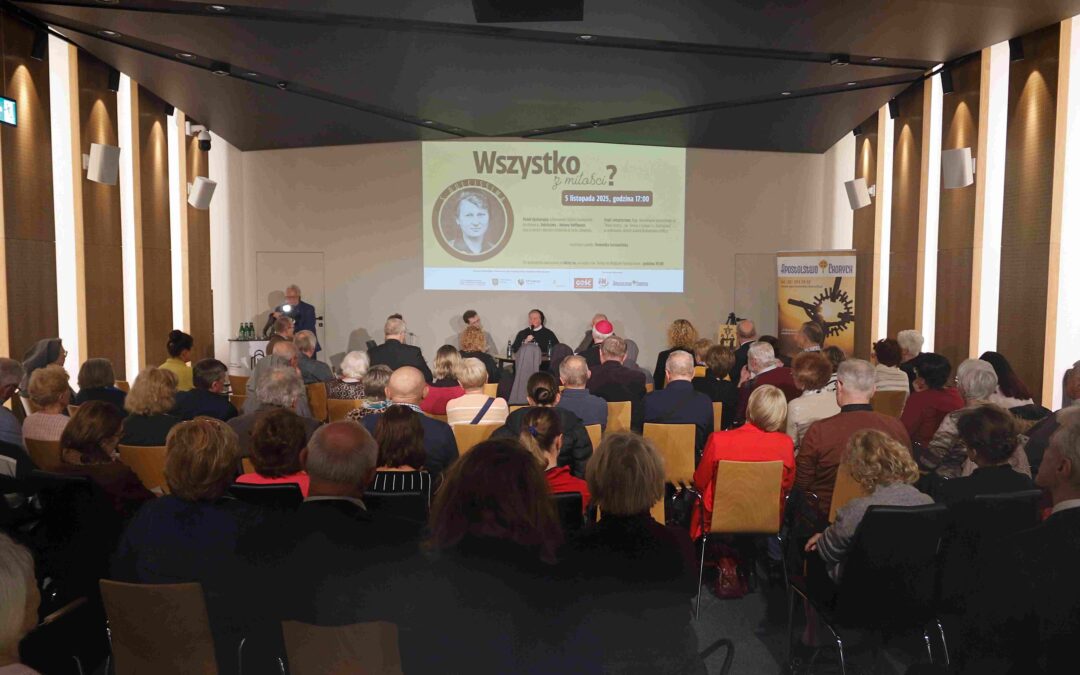
Nov 17, 2025 | DAILY BREAD
Tuesday of week 33 in Ordinary Time
Dedication of the Basilicas of Saints Peter and Paul, Apostles
Reading: 2 Maccabees 6:18-31
Eleazar’s witness in today’s reading is a stunning reminder that authentic love for God cannot coexist with even the smallest compromise. At ninety years old, he was offered an easy escape, not true betrayal, but mere pretence, a simple act of outward conformity that would save his life. Yet he refused even that illusion, saying such behavior “does not square with our time of life,” meaning that fidelity to God is not negotiable at any stage and certainly not at life’s end. His integrity flowed from a heart that knew God deserved truth, not appearances. On the feast of the Dedication of the Basilicas of Saints Peter and Paul, we recall two pillars of the Church who, like Eleazar, chose authenticity over convenience and truth over self-preservation. Their apostolic courage built the foundations of our faith; Eleazar’s fidelity shows that the same courage is asked of every believer. Temptations today rarely demand open denial—more often they invite pretence, subtle compromises, small concessions of conscience. Eleazar teaches us that even the appearance of infidelity diminishes the dignity of our love for Christ. True discipleship is transparent, consistent, and rooted in truth. Let’s reflect: Do I resist even the subtle temptations to “pretend” in my faith, choosing instead the clear, honest fidelity that honors Jesus with my whole life?
Don Giorgio

Nov 17, 2025 | NEWS
Panel on Sister Dulcissima Hoffmann at the Upper Silesian Pantheon
On November 5, 2025, in Katowice, at the headquarters of the cultural institution – the Upper Silesian Pantheon, located in the basement of the Archcathedral of Christ the King, a panel discussion entitled “Everything Out of Love” was held. The meeting was dedicated to Sister Dulcissima Hoffmann, one of the most moving and spiritually profound figures of the Silesian Church.
The event brought together numerous clergy, scholars, journalists, and faithful who wanted to deepen their reflection on her life, spirituality, and message. The meeting was part of the Archdiocese of Katowice’s jubilee year, celebrating its 100th anniversary, and its aim was also to support the ongoing process of beatification of Sister Dulcissima.
The event was initiated by Adam Kraśnicki, who has been associated with the Catholic Programs Department of Polish Television for many years. The panel was opened by Ryszard Kopiec, director of the Upper Silesian Pantheon, who emphasized the importance of remembering Sister Dulcissima for the spiritual heritage of the region.
The speakers included representatives of various fields—theology, philosophy, church history, and medicine—who introduced the participants to the phenomenon of the Silesian mystic’s spirituality. Their reflections showed that Sister Dulcissima’s message remains relevant and inspiring for contemporary people as well.
The panel was moderated by Dominika Szczawińska, who did not shy away from difficult and sometimes provocative questions – about the meaning of suffering, the image of God, and the human attitude towards extreme experiences when the Creator seems to “demand” suffering.
The spiritual and artistic complement to the meeting was the monodrama “Two Sisters” performed by Krakow actress Izabela Drobotowicz-Orkisz, with musical accompaniment by Dominika Salik. The 20-minute performance showed the spiritual bond between Sister Dulcissima and St. Thérèse of Lisieux.
After the performance, the actress emphasized:
“The adventure with Sister Dulcissima is one of the most beautiful. Her cry touched my heart deeply: ‘Jesus, give me the flight of an eagle. I don’t want to sit on the ground like a partridge.’” The juxtaposition of the thoughts of Sister Dulcissima and St. Thérèse helped the participants enter into the mystery of the cross—or rather, the mystery of love, which human beings are capable of even in suffering, if they can make it a gift offered to God and other people.
Barbara Gruszka-Zych, journalist and poet, drew attention to Sister Dulcissima’s extraordinary approach to everyday life and suffering:
“She taught that every day of life is a celebration. Even more, that even suffering can be a celebration because it is a gift from Jesus Christ, the Beloved. This is a great mystery and challenge.”
Prof. Henryk Olszar noted:
“Looking at Sister Dulcissima and reminding young people of her is a useful and commendable thing. Young people have their advocate in her.”
The meeting ended with a solemn Eucharist in the chapel of St. Thérèse of Lisieux at the Faculty of Theology of the University of Silesia, celebrated by Bishop Marek Szkudło. Prayer and contemplation were a natural conclusion to the evening, which symbolically united two spiritual figures—Sister Dulcissima and Little Thérèse.
The atmosphere of the entire event was full of reflection and gratitude for the spiritual legacy left by Sister Dulcissima Hoffmann.
The participants unanimously emphasized that the life of Sister Dulcissima Hoffmann is still a living source of inspiration—an example of courage, joy, and boundless trust in God.
S.M. Małgorzata Cur

Nov 16, 2025 | DAILY BREAD
Saint Elizabeth of Hungary, Religious
Monday of week 33 in Ordinary Time
Reading: 1 Maccabees 1:10-15, 41-43, 54-57, 62-63 41-43. 54-57. The reading from Maccabees presents a stark and heroic witness: there were men and women who preferred to die rather than profane the holy covenant. Their courage exposes the depth of fidelity that true faith demands, a fidelity that does not bend to pressure, convenience, or cultural trends. They knew that the covenant was not merely a set of rules, but their very relationship with God, the treasure of their identity. Saint Elizabeth of Hungary embodies this same unwavering devotion in a very different way: not through martyrdom, but through a life of radical charity, humility, and fidelity to the Gospel amid the temptations of wealth and privilege. Both the martyrs of Maccabees and Saint Elizabeth remind us that holiness often requires costly choices, choices that protect the sacred space of our relationship with God from anything that would dilute or dishonor it. Fidelity is not dramatic heroism alone; it is the daily willingness to choose God over compromise, love over indifference, truth over comfort. Let’s reflect: Do I value my relationship with God so deeply that I choose fidelity over convenience, even when the cost feels high?
Don Giorgio

Nov 15, 2025 | DAILY BREAD
- 33rd Sunday in Ordinary Time
Readings: Malachi 3:19–20a; 2 Thessalonians 3:7–12
The readings of this Sunday offer a powerful balance between God’s gracious promise and our human responsibility. Malachi speaks of “the sun of justice with its healing rays” rising for all who fear the Lord, a radiant image of God’s mercy that restores, heals, and brings wholeness where there was brokenness. God’s justice is not punishment for the faithful but light that renews the soul. Yet Saint Paul reminds us that this healing light does not excuse us from effort; rather, it strengthens us to live responsibly. He warns against idleness and disorder, insisting that faith must shape the way we work, eat, and order our daily lives. In other words, God shines His healing rays upon us not to make us passive, but to free us to live diligently, gratefully, and purposefully. When divine justice meets human responsibility, life becomes a collaboration with God, where grace inspires effort, and effort becomes a testimony of our love for Him. Let’s reflect: Do I welcome God’s healing light in a way that transforms my daily habits, making my work, discipline, and way of living a true response to His grace?
Don Giorgio

Nov 14, 2025 | DAILY BREAD
Saturday memorial of the Blessed Virgin Mary
Saturday of week 32 in Ordinary Time
Saint Albert the Great, Bishop, Doctor
Reading: Wisdom 18:14-16; 19:6-9
The Book of Wisdom presents a magnificent vision of the all-powerful Word of God, who enters human history not with noise or force, but with decisive, saving power. In the stillness of the night, God’s Word leapt from heaven to confront darkness and deliver His people, showing that it is His voice, not human strength, that changes the course of events. This same Word later becomes flesh in Jesus Christ, whose life, death, and resurrection reveal that God’s power is gentle yet unstoppable, humble yet victorious. Saint Albert the Great, a towering intellect of the Church, dedicated his life to contemplating this divine Word present in Scripture, creation, and the mysteries of faith. His example teaches us that true wisdom lies not in our brilliance, but in letting the Word of God illuminate our minds and shape our actions. When we welcome this Word into our hearts, everything is transformed: confusion becomes clarity, fear yields to courage, and ordinary life opens to divine meaning. Let’s reflect: Do I allow the all-powerful Word of God to speak into my life and shape my decisions, or do I rely more on my own strength and understanding?
Don Giorgio





